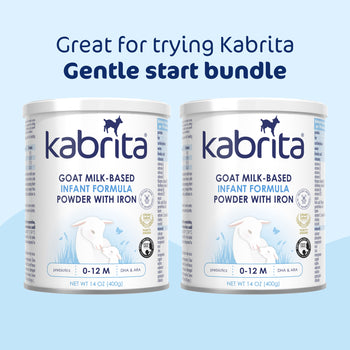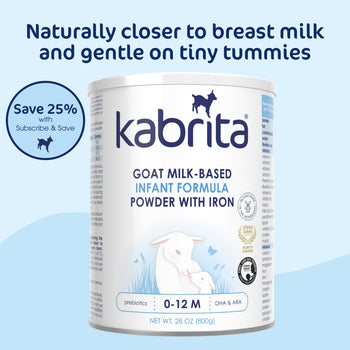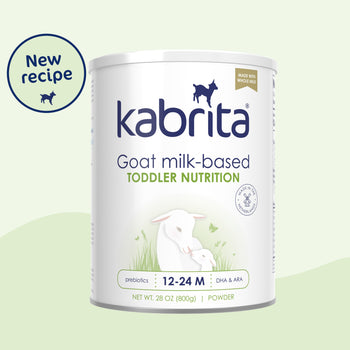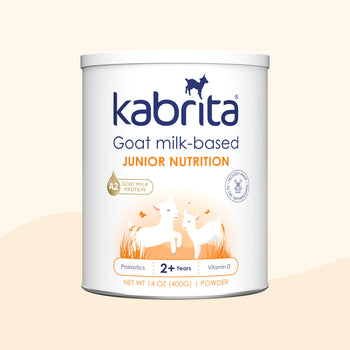Why You Should Consider Prebiotics & Probiotics for Your Little One's Gut

Does your little one’s digestion and food intake make you question if their gut health is on point? Prebiotics versus probiotics? What’s a gut microbiome and why is it important anyway? Many parents find themselves asking these questions. We break down the importance of gut health and why Kabrita Junior Nutrition, with naturally occurring prebiotics, and added pre and probiotics, may help to support a healthy gut in your little one.
What is the gut microbiome?
In recent years, we have begun to better understand the importance of the gut microbiome on the gastrointestinal system and overall health. The gut microbiome refers to the tiny beneficial organisms that live in the gastrointestinal tract and impact our health, aka the good bacteria. In addition to playing an important role in digestive health, the gut microbiome also helps the immune system by creating a type of barrier in the digestive system against harmful bacteria. The good bacteria that live in our gastrointestinal tract influences the brain and nervous system, atopic and allergic diseases, and even metabolic disorders such as obesity and type 2 diabetes.
The development of the gut microbiome begins at birth and continues to change throughout a person’s life depending on various factors. Diet, for one, significantly influences the bacteria that live in our gut. Highly processed foods and food additives disrupt the microbiome, while prebiotic and probiotic foods enhance it. Other factors that impact our gut bacteria include certain medications, exercise, and other lifestyle factors such as stress.
What are prebiotics?
Prebiotics are food components or dietary fibers that are not digested by the gut, but when broken down, provide fuel or ‘food’ for the good bacteria in the gut, resulting in a health benefit. Prebiotics have been shown to improve the barrier function of the gut and therefore help the immune system to reduce the number of ‘bad’ bacteria in the gut.
Oligosaccharides are the main type of prebiotics found in food. Many fruits, vegetables and grains naturally contain prebiotics including garlic, onions, asparagus, and wheat. Specific types of prebiotic food components include inulin, fructo-oligosaccharides (FOS) and galacto-oligosaccharides (GOS).
What are probiotics?
Probiotics are live beneficial microorganisms (good bacteria) that when consumed become part of our gut microbiome and positively influence health in certain amounts. Probiotics can be found naturally in food, such as yogurt and kefir, fermented pickles, sauerkraut, kimchi and kombucha. Probiotics can also be added as an ingredient in foods or taken as a supplement.
Goat milk contains natural prebiotics
Goat milk contains many unique qualities that may be beneficial for the digestive system, and the natural presence of prebiotic oligosaccharides is key. Kabrita’s goat milk contains 6 times more oligosaccharides than cow milk as well as a greater diversity of prebiotic oligosaccharides than cow milk, meaning more different types of prebiotics, which may be beneficial for the gut microbiome. 
Kabrita Junior contains added prebiotics and probiotics
Kabrita Junior Nutrition is based on the gentleness of goat milk and may be an ideal nutritional boost for children 2 years old and up. In addition to easy-to-digest A2 goat milk protein and the naturally occurring prebiotics found in goat milk, Kabrita Junior also contains added pre and probiotics. Inulin is a well-studied prebiotic fiber that helps to fuel the good bacteria in the gut, and each cup of Kabrita Junior contains 1.35 grams of inulin fiber. Kabrita Junior also contains the probiotic Bifidobacterium animalis, with each cup delivering about 26 million CFUs.
With easy-to-digest goat milk protein and natural prebiotics, as well as added prebiotics and probiotics, Kabrita Junior may be an ideal choice to support a healthy gut in your growing little one. Click here to try Kabrita Junior Nutrition with your own family!
To learn more about making the switch to Kabrita Junior, check out our blog Transitioning from Kabrita Toddler Formula to Kabrita Junior.
*Goat milk products, including Kabrita products, are not recommended in cases of cow milk protein allergy. Always consult with your pediatrician before making feeding changes.




